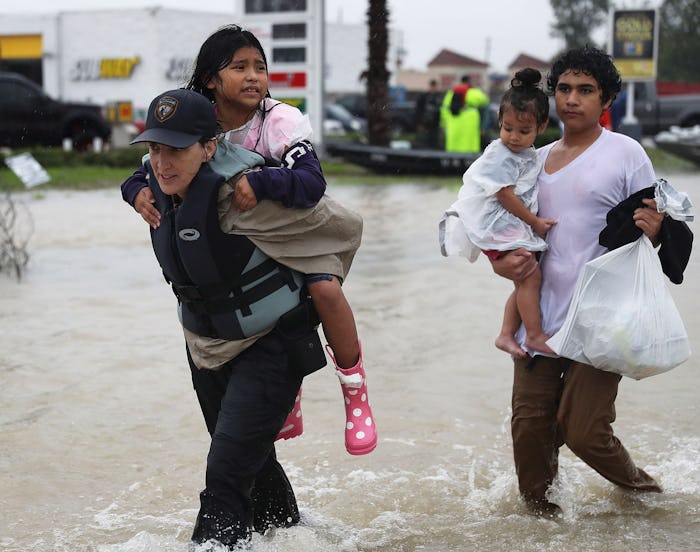Life

This Is What Your Child Needs To Hear During A Natural Disaster
The other day, my daughter Claire and I sat on our front porch waiting for my husband to arrive home. “Daddy!” she said as he pulled in the driveway. He ran to scoop her up, holding her close, before telling me about a news clip he had seen of a woman being airlifted from the aftermath of Hurricane Harvey. “She was holding a baby,” he said, shaking his head in disbelief. As we talked about the devastation, we both could not help but wonder, how do you talk to your child about a natural disaster? How do you explain something like this to them? Experts say there are a few things to keep in mind and it starts with honesty.
Julia Cook, author of The Ant Hill Disaster, a book that addresses both human- and naturally-caused disasters, tells Romper that in addition to a sense of normalcy, it's important for parents to remain calm and reassuring during a natural disaster. "Create an atmosphere where children are comfortable talking and asking questions," she says. "Always answer a child’s questions truthfully and with simple answers. You don’t need to go into more detail than necessary, but lying to your children or making up facts will ultimately confuse them. Eventually when they find out the truth about what happened, they may struggle with trusting you in the future."
Edward Colson, principal owner of Portland-based Ready Northwest, LLC, agrees with Cook, adding that parents should let children know what is happening and give them an age-appropriate message “about what the next steps are, such as letting them know that ‘we are evacuating to a safe place because of a natural disaster coming.’” Like Cook, Colson tells Romper in an email interview that once you arrive at a shelter, it is crucial to quickly re-establish a routine to help kids deal with a natural disaster.
"If you have lunch time, nap time, or read stories before bed, resume those as quickly as you can to bring stability to their days," he says.
Cook says parents shouldn't be surprised if their kids ask them to repeat answers to questions several times. "Be consistent in your reply, and realize that your repetitive answers are reassuring your child’s 'need to know' and building upon their sense of security."
When readying for a disaster, Colson says his company also recommends parents include children in the preparations. “Parents can help them create their own comfort kit with items they'd want to include in their disaster kit, such as coloring books, small toys, stuffed animals, and games.”
If disaster does hit home, then books geared toward children, like Cook's Ant Hill, A Terrible Thing Happened by Margaret M. Holmes and Sasha J. Mudlaff, and David and the Worry Beast: Helping Children Cope with Anxiety by Anne Marie Guanci can help them to better understand their emotions.
Above everything, Cook says, "Acknowledge and normalize your child’s thoughts, feelings and reactions. Help children understand why they feel this way.”
And that's something big kids could use a little of, too.